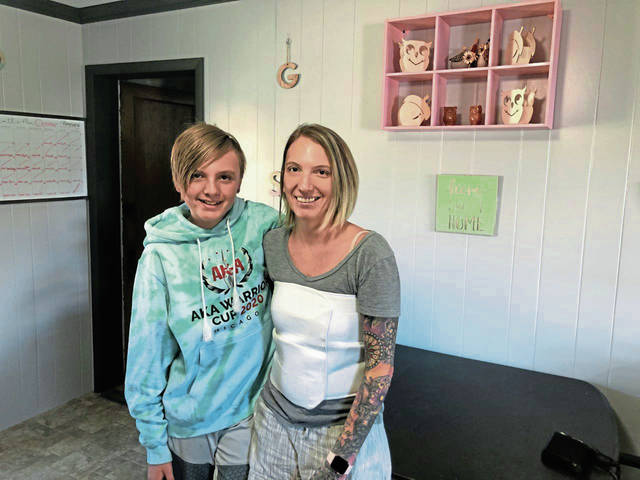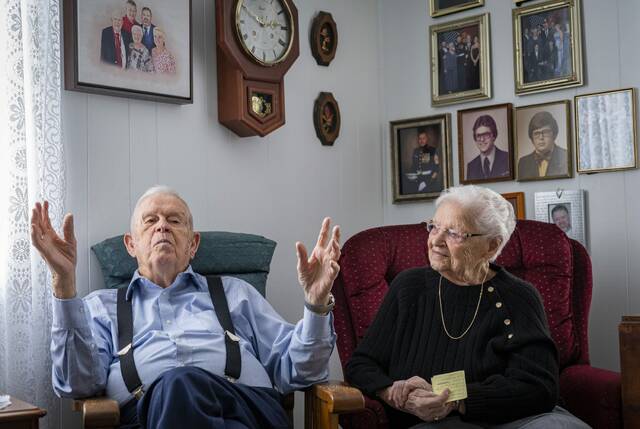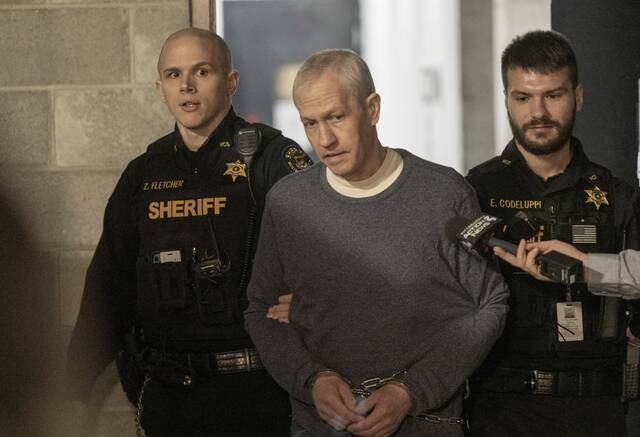A North Huntingdon wife and mother of two — inspired to help others during the coronavirus pandemic — may have given a complete stranger the gift of life.
“With all the horrible things going on out there (with the pandemic), I wanted to give a little bit of hope back to somebody,”said Tiffany Galley, who underwent surgery at UPMC Montefiore in Pittsburgh’s Oakland neighborhood to donate a kidney to an Erie woman.
“Someone was in complete renal failure, and I was a complete perfect match” to serve as her donor, the 35-year-old Galley said as she sat in the kitchen of her Westmoreland City home.
The surgery left her without a left kidney and with a vertical incision at her navel and a small incision on her left side. During her six-week recovery period, she wears a white abdomen binder that could be best described as a modified girdle to help prevent any internal injury that might occur if she is bumped by her boys, 11 and 6, or two active German shorthaired pointers.
She is slowly regaining strength and eating smaller portions as her body becomes accustomed to having only one kidney. She is drinking “tons of water” and eliminated caffeine from her diet, which she normally did not consume.
Galley is thankful for her family and friends who have provided meals.
During her recovery, her boys “have been super helpful,” carrying the laundry and groceries because, under doctor’s orders, she is not to lift anything more than 10 pounds. Her older son, Rayden, understands what she went through, while her younger son, Greysen, was told “mommy had to go to the hospital and she would have a boo-boo” when she came home four days later. She advised her sons to go to school and maintain their routine while she was in the hospital.
Her husband, Randy, has been supportive of her decision to undergo the life-sustaining surgery for another person, she said.
“He’s my rock. He was worried,” Galley said, but “he was behind me 100%.”
Galley is a fan of body art and has tattoos on her arms and legs that are dedicated to her family and activities she enjoys, such as hiking. She plans to get one about her kidney donation.
Kidney donor
The journey to being an organ donor began for the Norwin graduate in June 2018, when she registered to be a donor after reading a friend’s Facebook post about another person in need of a kidney. Galley was tested, but her antibodies did not match the intended recipient.
“I just felt it was something in my heart, that I had to help someone else,” Galley said.
She remained on the kidney donor register and went about her life as a wife and mother until receiving a phone call in early September asking her to be a donor.
“I never thought that day would come, because it had been two years,” Galley said.
She underwent “tons of lab work,” but had to postpone the surgery because of family commitments. She was ready for the surgery in early October.
Living donors are thoroughly screened and the pre-surgery testing and preparation “is centered completely around the donor’s safety,” said Dr. Amit Tevar, director of UPMC’s kidney and pancreas transplant program.
The health of the kidneys and patients is tested to determine whether there are any problems with living long-term with one kidney, such as kidney stones or cancer, Tevar said. A critical test is done when blood from both the donor and the recipient is placed in a test tube to see if there is any adverse reaction to indicate if the organ would be rejected, Tevar said.
Galley said she did not play “doctor” by searching the internet to learn about about the kidney donation surgery.
“I did not want to get freaked out and back out at the last second,” Galley said.
She was concerned about the surgery but not afraid.
“I have many people looking down at me (to help me) through the process,” Galley said, including her mother, Karen Yonika, who died in 2015.
Donors undergo a laproscopic surgery performed through two ½-inch incisions and a small incision through which the kidney is extracted, Tevar said.
Galley said she was in pain after the procedure, as muscles were cut.
“I just want people to know it is a normal procedure,” Galley said. “It’s not hard to get tested. You can save somebody’s life.”
UPMC typically does about 100 live kidney donor transplants a year and about 100 from cadavers, Tevar said.
“These (live donors) are truly selfless people,” Tevar said.
After her surgery, Galley’s kidney was flown by medical helicopter to Erie, where it was transplanted without complications. The first question she asked when she regained consciousness was how the recipient was doing, Galley said.
She hopes to meet the recipient when both are recovered.
“We have a connection,” Galley said.








